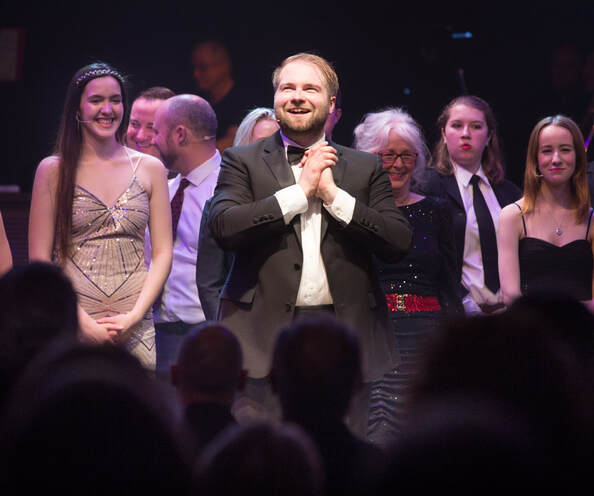|
1. Tell us about yourself and your business. In 2014, I moved back home to Cape Breton (after 8 years in Ontario) to found the Highland Arts Theatre with a ragtag group of eager young artists. We had no idea whether it would work, and at the time, the idea of a professional theatre venue in downtown Sydney seemed foolhardy at best and one of our first performances had six people in attendance. Fast forward six years, we've become the second-largest professional theatre operating in Nova Scotia with a gross annual revenue of over $1.2 million. While the pandemic has certainly thrown a curveball to our projections, we're so grateful that the virus has been so relatively mild in Cape Breton, and we are currently innovating our way into the "new normal" with physically distanced seating for two productions, one of the only theatres in Canada open with live performances. The key to surviving what could have been an extinction-level threat was our precedent-setting new model, Radical Access, which essentially crowdsources our revenue needs in exchange for charitable receipts and a whole catalogue of perks, including free tickets for each of our Mainstage Productions (for more information, feel free to check out: http://www.highlandartstheatre.com/radical-access The campaign received national and international attention with articles in the Globe and Mail and New York Times and only 5 weeks into launch (at the time of writing) we are currently 83% of the way to our ambitious goal of $50,000/month in donations. (Editor's note: As of print time, they're at 95.5% of their goal!!!) 2. What was your path to your current position/ business? All of my life I knew I wanted to make a life for myself in theatre, but I never imagined it was something I could do in Cape Breton. Growing up, I always assumed I'd have to move to Toronto or elsewhere to have even a chance of making a living. Never in my wildest dreams did I think we could build something as incredible as the HAT or that it would prove sustainable (even pandemic-proof) in this small community, yet it is precisely the support of the community that has made our vision possible. The fact that theatre is now an honest-to-goodness industry in Cape Breton (buffeted by the enormous growth of the Savoy Theatre as well) is nothing short of incredible. The fact that young people can go away for training and have a hope of coming home and being paid to work in their chosen field is a dream come true. 3. How long has your business been operating in CB? How long have you been running it? We've been operating since May 23, 2014 and I've been giving virtually every second of time, pint of blood, and gallon of sweat since. 4. What inspired you to operate a business in Cape Breton/ Unama’ki? When the opportunity came to start a theatre in Cape Breton, I couldn't pass it up. The fact that it actually worked has been nothing short of miraculous and - honestly - I don't know if it could have worked in a different community. There is so much talent and appreciation for art and music here, and people are so excited to support new things. Cape Breton has had a rough go over my lifetime. It's often felt like there's "less" here, but I think that makes us appreciate everything that much more. My mission was that no one would be able to say "there's nothing to do here" anymore, and with programming almost every night of the year, I think we've achieved that goal. 5. What was your “ah-ha” moment when you knew you had the right idea? In our first year, our very first season, we had about 350 season ticket subscribers. I remember saying to my friend Jonathan, "If only we could get to 1000 subscribers. Then we could actually have a budget and do some things. Maybe we can get there in like... 10 years..." and then less than a year later we hit that mark. That's when I knew something was working. 6. What did you study in school? How has it helped you in your journey? I went to Sheridan College in Oakville for Musical Theatre Performance when I was 16, and then went to George Brown Theatre School after I finished because I wanted a more focused training in acting. Along the way, one of the first things I learned is that there really isn't such a thing as a full-time career as an actor in Canada. Certainly not in the theatre. You have to be versatile and you have to come prepared for anything. So I started writing and producing while in school, initially as a way to create work for myself as an actor. As I gained momentum, I discovered I had just as much of a knack for the other aspects of making theatre and I think it's largely because of that that I've never stopped working. I had so many mentors who helped guide my training, in school and after. One of the most crucial places where I learned how to actually operate a theatre was working as a Box Office Manager at Tarragon Theatre. Without those lessons, the HAT never could have existed. 7. If there was one thing you could have done differently early in your career, what would it be? Taken out pandemic insurance... Other than that... I have to say, I've been very lucky. I've had incredible opportunities and I work very hard. There's not much (if anything) I would change. I think that's mostly because of my attitude; I really try to take every hiccup or setback as a learning opportunity and grow towards the next challenge. My motto in life is "Dare to Fail" and while I've been pretty lucky in our rapid success, it's the failures that really teach you the crucial lessons. 8. What is your advice to a ‘shiny new’ business owner or entrepreneur? At the risk of being cheesy: If there's something you want that you know in your gut is missing from your community, you can make it happen. Yes, it will take work, yes, it will sometimes seem impossible, but if you have a vision that is connected to truth and passion and aligns with what you were put on this earth to do... there is nothing you can't accomplish. 9. What advice would you offer aspiring business owners or entrepreneurs who want to stay on the Island? One of my favourite lyrics of all time is from We Are an Island... "and fight for the right to leave or to stay." I don't think everyone should leave. I don't think everyone should stay. I think it's important for everyone to feel the freedom to do what their heart tells them and if they go, maybe they'll come back. Or not. And that's okay. But if you have a desire to make a life and a business on Cape Breton Island, this is the time. There is fertile ground here and the harvest is coming. Things have changed so much in the last thirty years and there's an atmosphere primed for change that is unlike anything I've ever experienced. Now is the time to dream big. Now is the time to take risks. And for those who decide not to come back, let it not be because they didn't have a choice. 10. Where do you see the future of your business/ industry/ Cape Breton headed? With COVID-19 changing literally every aspect of society, it's hard to know what is coming next. Especially in the performing arts. All I can say is that as long as people continue to support us, we will be here, doing what we do best: creating world-class productions with Cape Breton talent for Cape Breton audiences and making things as accessible and inclusive as possible. There's nowhere I'd rather be.
0 Comments
Your comment will be posted after it is approved.
Leave a Reply. |
Archives
December 2021
Categories
All
|
nextgencb


